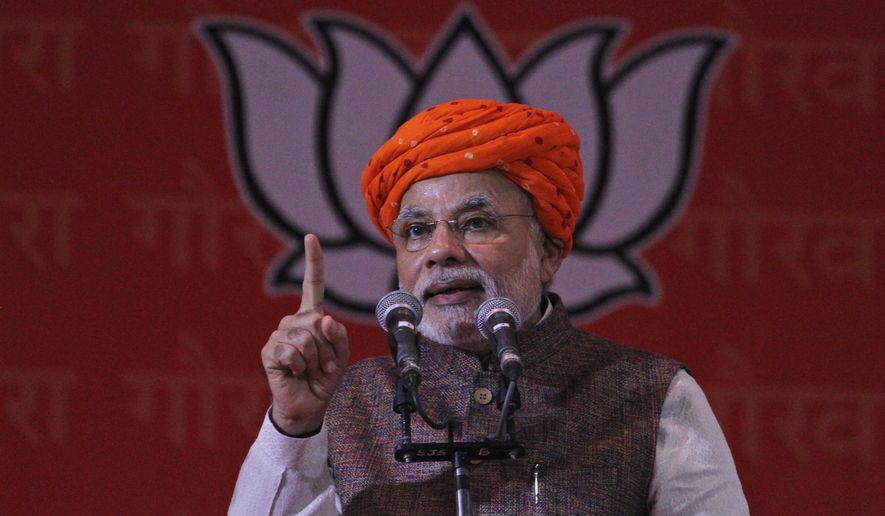Seeking to put some muscle behind his promise to revamp and revitalize his nation’s economy, Indian Prime Minister Narendra Modi will unveil a sweeping “Make in India” campaign Thursday just ahead of his highly anticipated trip to the U.S.
The aim of the campaign will be to turn India, which has lagged behind rival China in the international economic sweepstakes, into a global manufacturing hub and generate major job opportunities across the country, officials said. The campaign will be presented to executives of some 3,000 companies and will be publicized in world capitals, according to a report by New Delhi Television Ltd.
Mr. Modi invited the global business community to “come, make in India,” as he announced the campaign’s slogan during an Independence Day address. He aims for major corporations to set up manufacturing facilities in India while tearing down regulatory and bureaucratic barriers.
The Modi government, which took power in May, also is looking to simplify regulatory processes and reduce the burden of compliance for domestic and international investors.
The prime minister is promising to set up cells to resolve issues within 48 hours and assembled back-end support to answer specific inquiries within 72 hours.
The government identified more than two dozen sectors that could become world leaders, including information technology, tourism, health care and automobile manufacturing.
SEE ALSO: Pro-trade Indian leader to visit Washington
The campaign’s aim is to shift the economy from the services-driven growth model to more labor-intensive manufacturing. India has nearly 10 million people who join the workforce every year, and a shift in focus could help create jobs for those people. India reported a jobless rate of 8.2 percent in mid-2014.
“The government is committed to chart out a new path, wherein business entities are extended red carpet welcome in a spirit of active cooperation. Invest India will act as the first reference point for guiding foreign investors on all aspects of regulatory and policy issues and to assist them in obtaining regulatory clearances,” the government said in a statement ahead of the rollout.
Not everyone is sold on the prime minister’s ability to transform the Indian economy, which is widely seen as falling short of its potential compared with China and other Asian “tigers.”
Anand Sharma, head of the opposition Congress party, told reporters in New Delhi that the “Make in India” agenda recycles many of the ideas in motion before Mr. Modi was elected.
“It is good for branding, good for marketing, and it sends a positive message,” Mr. Sharma said. “But the BJP government, particularly the prime minister, should stop saying that this is happening for the first time.”
Mr. Modi, whose BJP party won an overwhelming mandate this year in large part on the strength of his record boosting the economy as head of the state of Gujarat, will fly to the U.S. on Friday in hopes of boosting economic relations between the world’s two largest democracies.
The pro-business prime minister will meet with business leaders and CEOs of Fortune 500 companies during his stops in New York and Washington.
Mr. Modi will focus on enhancing manufacturing, developing infrastructure and attracting foreign investment to create jobs, said Lisa Curtis, a senior research fellow at The Heritage Foundation.
Ms. Curtis said U.S. businesses are eager to help cultivate Mr. Modi’s promised reforms.
“He’s been in office for four months now, and we’re still waiting to see some concrete movement with regard to economic growth and reform,” she said this week.
Mr. Modi has a packed agenda for his Washington trip. Highlights include a sold-out rally of more than 18,000 people Sunday at New York’s Madison Square Garden and a policy address to the U.S.-India Business Council in Washington on Tuesday.
• Mark Pace can be reached at mpace@washingtontimes.com.




Please read our comment policy before commenting.